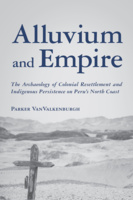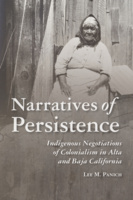A Tale of Three Villages
Indigenous-Colonial Interactions in Southwestern Alaska, 1740–1950
Unsettling Mobility
Mediating Mi'kmaw Sovereignty in Post-contact Nova Scotia
Since contact, attempts by institutions such as the British Crown and the Catholic Church to assimilate indigenous peoples have served to mark those people as “Other” than the settler majority. In Unsettling Mobility, Michelle A. Lelièvre examines how mobility has complicated, disrupted, and—at times—served this contradiction at the core of the settler colonial project. Drawing on archaeological, ethnographic, and archival fieldwork conducted with the Pictou Landing First Nation—one of thirteen Mi’kmaw communities in Nova Scotia—Lelièvre argues that, for the British Crown and the Catholic Church, mobility has been required not only for the settlement of the colony but also for the management and conversion of the Mi’kmaq.
Forging Communities in Colonial Alta California
The influx of Spanish, Russian, and then American colonists into Alta California between 1769 and 1834 challenged both Native and non-Native people to reimagine communities not only in different places and spaces but also in novel forms and practices. The contributors to this volume draw on archaeological and historical archival sources to analyze the generative processes and nature of communities of belonging in the face of rapid demographic change and perceived or enforced difference.
Silver “Thieves," Tin Barons, and Conquistadors
Small-Scale Mineral Production in Southern Bolivia
This book traces the history of Indigenous mining in southern Bolivia from Inka times to the present using archaeological and historical sources. It argues that small-scale mineral production can only be understood in relation to large-scale mining in the context of colonialism and its aftermath.
Landscapes and Social Transformations on the Northwest Coast
Colonial Encounters in the Fraser Valley
The Archaeology of Refuge and Recourse
Coast Miwok Resilience and Indigenous Hinterlands in Colonial California
As an Indigenous scholar researching the history and archaeology of his own tribe, Tsim D. Schneider provides a unique and timely contribution to the growing field of Indigenous archaeology and offers a new perspective on the primary role and relevance of Indigenous places and homelands in the study of colonial encounters.
Decolonizing “Prehistory”
Deep Time and Indigenous Knowledges in North America
Decolonizing “Prehistory” critically examines and challenges the paradoxical role that modern historical-archaeological scholarship plays in adding legitimacy to, but also delegitimizing, contemporary colonialist practices. Using an interdisciplinary approach, this volume empowers Indigenous voices and offers a nuanced understanding of the American deep past.
Alluvium and Empire
The Archaeology of Colonial Resettlement and Indigenous Persistence on Peru’s North Coast
Alluvium and Empire examines the archaeology of Indigenous communities and landscapes that were subject to Spanish colonial forced resettlement during the sixteenth century. Written at the intersections of history and archaeology, the book critiques previous approaches to the study of empire and models a genealogical approach that attends to the open-ended—and often unpredictable—ways in which empires take shape.
Narratives of Persistence
Indigenous Negotiations of Colonialism in Alta and Baja California
Narratives of Persistence charts the remarkable persistence of California’s Ohlone and Paipai people over the past five centuries. Lee M. Panich draws connections between the events and processes of the deeper past and the way the Ohlone and Paipai today understand their own histories and identities.
Decolonizing Indigenous Histories
Exploring Prehistoric/Colonial Transitions in Archaeology
Challenging Colonial Narratives
Nineteenth-Century Great Lakes Archaeology
Becoming Brothertown
Native American Ethnogenesis and Endurance in the Modern World
Indigenous Landscapes and Spanish Missions
New Perspectives from Archaeology and Ethnohistory
Revolt
An Archaeological History of Pueblo Resistance and Revitalization in 17th Century New Mexico
Traditional text-based accounts tend to focus on the revolt and the Spaniards’ reconquest in 1692—completely skipping over the years of indigenous independence that occurred in between. Revolt boldly breaks out of this mold and examines the aftermath of the uprising in colonial New Mexico, focusing on the radical changes it instigated in Pueblo culture and society.
Published in cooperation with the William P. Clements Center for Southwest Studies, Southern Methodist University.















